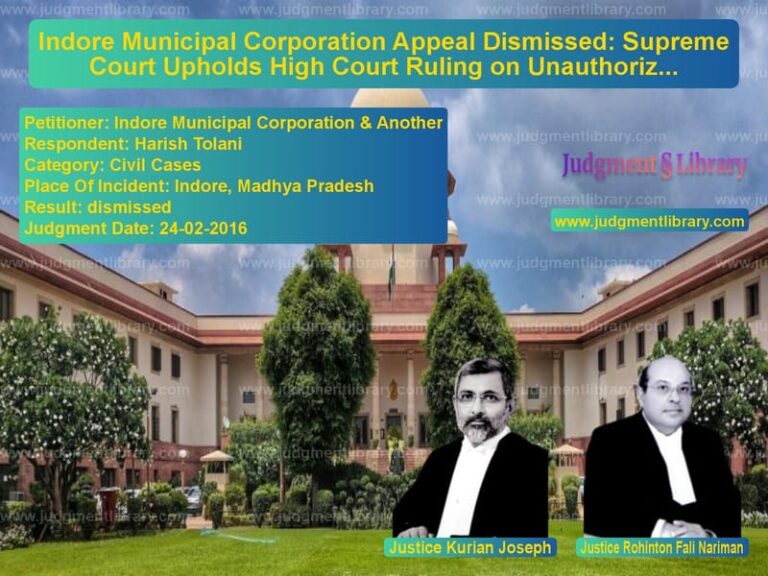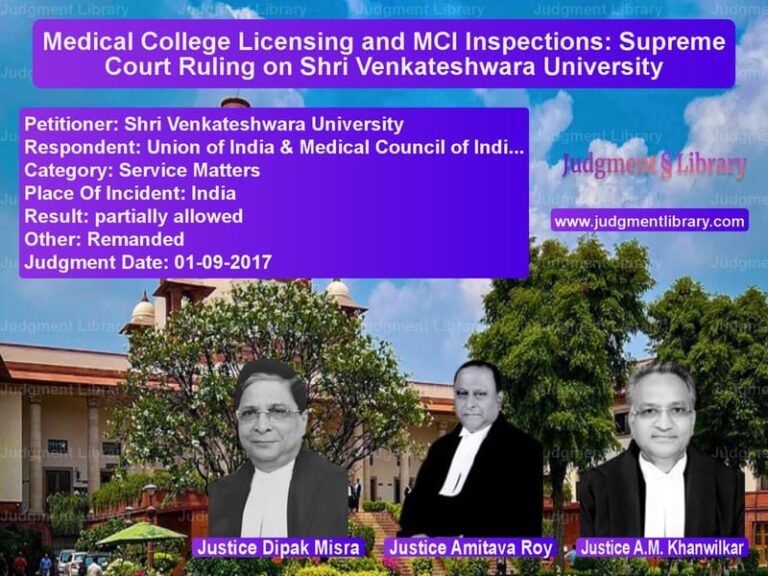Recruitment Eligibility Clarified: Supreme Court Upholds Equivalent Qualification for Job Selection
The case of Sajid Khan vs. L. Rahmathullah & Ors. addresses a significant issue in recruitment jurisprudence regarding whether certain educational qualifications are equivalent to those prescribed in a job advertisement. The Supreme Court ruled in favor of the appellants, holding that their qualifications were indeed equivalent and that their appointments were justified.
The case arose from the selection process for the post of Junior Engineer (Electrical) in the Union Territory of Lakshadweep, Department of Electricity. The recruitment notification specified that candidates must possess either:
- A Degree in Electrical Engineering from a recognized university, or
- A Diploma in Electrical Engineering from a recognized institution with two years of relevant experience.
The appellants held a Diploma in Electrical and Electronics Engineering, while the respondents, who were not selected, held a Diploma in Electrical Engineering. The respondents challenged the selection process, arguing that the appellants did not meet the eligibility criteria.
Background of the Case
The dispute arose when the selected candidates (appellants) were appointed to the post of Junior Engineer (Electrical). The non-selected candidates (respondents) filed a petition before the Central Administrative Tribunal (CAT), arguing that the appellants did not possess the exact qualification mentioned in the recruitment notification.
The CAT ruled in favor of the respondents and set aside the selection of the appellants. The appellants challenged this ruling in the High Court, which upheld the CAT’s decision and directed that the select list be reconstituted to include only those candidates who held a Diploma in Electrical Engineering.
The appellants then approached the Supreme Court.
Arguments Presented Before the Court
Petitioner’s (Appellants’) Arguments
The appellants, represented by their counsel, contended that:
- Their qualification, a Diploma in Electrical and Electronics Engineering, was substantially the same as a Diploma in Electrical Engineering and should be treated as equivalent.
- The syllabus for both courses covered the same core subjects, with the only difference being the inclusion of additional subjects related to electronics.
- The recruiting authority had already accepted their qualification as equivalent based on clarification obtained from the Directorate of Technical Education, Kerala, which confirmed that a Diploma in Electrical and Electronics Engineering was treated as equivalent to a Diploma in Electrical Engineering.
- The respondents only challenged the selection process after the final select list was published, which was an afterthought and an attempt to disqualify otherwise eligible candidates.
Respondent’s Arguments
The respondents argued that:
- The recruitment notification explicitly specified a Diploma in Electrical Engineering, and no other qualification should be considered.
- There was no official equivalency notification from the employer recognizing a Diploma in Electrical and Electronics Engineering as equivalent to the prescribed qualification.
- The recruitment process should strictly adhere to the qualifications stated in the advertisement to maintain transparency and fairness.
- Accepting a different qualification would amount to modifying the eligibility criteria post-selection, which would be unfair to other candidates who did not apply.
Supreme Court’s Observations and Ruling
The Supreme Court analyzed the relevant recruitment rules and the equivalency clarification obtained from the Directorate of Technical Education, Kerala. It noted:
“The recruiting authority had sought a clarification regarding the equivalency of a Diploma in Electrical and Electronics Engineering with a Diploma in Electrical Engineering. The clarification issued by the Technical Education Department of Kerala confirmed that both qualifications were treated as equivalent in the state.”
The Court emphasized that when the employer (the recruiting authority) itself had accepted the qualification as equivalent, there was no basis for the CAT and High Court to interfere. It cited the principle that:
“The employer is the best judge of the required qualifications for a post. Courts should not interfere with recruitment decisions unless they are arbitrary or illegal.”
Key Judgments Cited
The Supreme Court relied on several past judgments to support its ruling:
- Anand Yadav v. State of U.P.: “It is the employer who decides the qualifications required for a post, and courts should not intervene unless there is a manifest error.”
- Maharashtra Public Service Commission v. Sandeep Shriram Warade: “Employers have the discretion to decide on equivalency, and courts should not substitute their judgment.”
- Union of India v. Uzair Imran: “Equivalency of qualifications is an administrative decision, not a judicial one.”
Final Judgment
The Supreme Court set aside the decisions of the CAT and High Court, ruling in favor of the appellants. It stated:
“In circumstances where the appointing authority has not objected to the qualifications of the appellants and there is no apparent or glaring difference in the qualifications, we see no reason for courts to interfere and set aside the appointments made after due consideration.”
The Court reinstated the appointments of the appellants and directed the recruitment process to stand as finalized.
Key Takeaways
This judgment clarifies several important principles in recruitment law:
- The employer has the discretion to recognize equivalent qualifications.
- Candidates with qualifications that are substantially similar should not be disqualified solely based on nomenclature differences.
- Court interference in recruitment matters should be minimal unless there is arbitrariness or illegality.
- Once a recruitment process is completed and select lists are published, challenges should not be entertained unless there is clear evidence of wrongdoing.
Conclusion
The Supreme Court’s decision in this case reinforces the principle that recruitment decisions should be left to the discretion of the employer, provided they are reasonable and justifiable. It also ensures that candidates are not unfairly disqualified based on technicalities when their qualifications meet the substantive requirements of the job.
Petitioner Name: Sajid Khan.Respondent Name: L. Rahmathullah & Ors..Judgment By: Justice Pamidighantam Sri Narasimha, Justice Manoj Misra.Place Of Incident: Lakshadweep.Judgment Date: 19-02-2025.
Don’t miss out on the full details! Download the complete judgment in PDF format below and gain valuable insights instantly!
Download Judgment: sajid-khan-vs-l.-rahmathullah-&-or-supreme-court-of-india-judgment-dated-19-02-2025.pdf
Directly Download Judgment: Directly download this Judgment
See all petitions in Recruitment Policies
See all petitions in Public Sector Employees
See all petitions in Employment Disputes
See all petitions in Judgment by P.S. Narasimha
See all petitions in Judgment by Manoj Misra
See all petitions in allowed
See all petitions in Quashed
See all petitions in supreme court of India judgments February 2025
See all petitions in 2025 judgments
See all posts in Service Matters Category
See all allowed petitions in Service Matters Category
See all Dismissed petitions in Service Matters Category
See all partially allowed petitions in Service Matters Category







